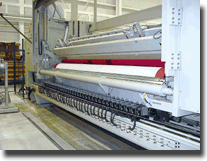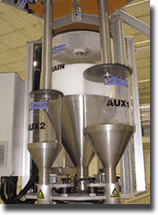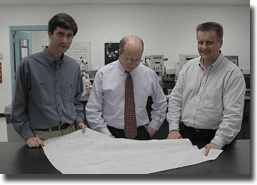
It is no secret that the U.S. textile companies most likely to flourish in coming years are
those, both large and small, that aggressively seek new opportunities and new efficiencies in the
marketplace. As more than one textile leader has maintained, an entrepreneurial spirit is essential
in todays very competitive business climate.
(See Parkdale Positions For Growth, TI, this issue). It was in this spirit that then-vice
president of business development for Unifi Inc., W. Michael Mebane, began looking for a new niche
that would add diversity to the Greensboro, N.C.-based companys highly successful polyester and
nylon yarn business. With 1999 sales of more than $1.2 billion, Unifi is the largest producer and
processor of textile yarns in the United States and one of the largest in the world. Mebanes search
for opportunity resulted in the creation of Unifi Technical Fabrics LLC, a $40-million plant in
Mocksville, N.C., that represents the companys first foray into the nonwovens
market. Exploring OptionsWe began looking for areas of growth areas in which we felt Unifi
would have a lot to add, Mebane said. Especially, we began looking at different polymers and how
they were used. Unifi has a great deal of experience in polyester and nylon, but we had noticed a
steady rise in the use of polypropylene. What really hit our radar screen was meltspun nonwoven
fabrics. When we looked in that direction, we saw a healthy growth curve, healthy and sound end-use
markets, and the opportunity to be among the first to employ a step-level change in technology.The
technology to be used was critical in the determination of the direction Unifi would take with its
new business. We were looking for something new, but which had been deployed long enough to be
proven, but not long enough that a lot of companies had converted to it. We felt we had a specific
window of opportunity to diversify into markets we had not served before. It provided a definite
synergy for us because we could bring all the expertise we had in polyester to the manufacture of
polypropylene. In essence, we would be making products similar to those that we had made in the
past, but for different markets. The opportunity to go directly from polymer to fabric was very,
very interesting to us, as well.Unifi looked at different methods by which it could enter the
meltspun market, including acquisition of an existing business or construction of a new facility.
Ultimately, the company decided to embark upon a new venture and, in July 1999, signed a contract
with Germany-based Reifenher GmbH for delivery and installation of its new Reicofil 3 SSMMS
technology, which allows high-speed manufacturing of spunbond and spunbond/meltblown/spunbond
fabrics. SMS technology enables the manufacture of fabric with a spunbond layer, a meltblown layer
and an additional spunbond layer. The fabric can have different properties on each face.
Meltblowing is a one-step extrusion process for the production of microfiber nonwovens from
thermoplastic resin pellets, hot-melts and raw-material blends.At the same time as the contract was
negotiated with Reifenher, a site search committee located the 120-acre site in Mocksville, a town
near Winston-Salem, N.C. Ground was broken in October 1999. Machinery was delivered in July 2000,
and the first piece of fabric was produced January 9 of this year.It all sounds smooth and easy,
but the accelerated schedule Unifi employed to construct and operate the facility was not without a
glitch here and there. One of the amazing things, said J. Allan Logie, director of operations, was
that the steel got us a little off schedule. The delivery of the steel for the manufacturing area
did not arrive on site until mid-May, and we were building the machine in July. We had a roof and a
concrete slab, but the sides were still off the building when we began construction of the machine.
That was quite a challenging time. It was a very fast-paced project. We ran polymer through the
machine on December 8, three days early according to the schedule we had established with Reifenher
in July 1999. We produced our first fabric on January 9 of this year. Seamless
TransitionDespite the fact that Unifi is new to the production of nonwoven fabrics, Mebane said the
business fits so seamlessly with the companys existing operations that he considers it one of
Unifis core competencies. Unifi produces polyester fiber both in the United States and in Europe,
he said. If you take a look at the suppliers of the critical components, whether they be spinnerets
or other equipment, they are the same vendors we deal with in our fiber business. We are able to
draw upon the experience of long-standing relationships. While it is a different process, much of
what we do and how we approach it is the same.The Reicofil 3 machine installation in Mocksville is
the largest in North America and among the largest in the world. Filament speed is rated at greater
than 3,000 meters per minute (m/min), and the line-speed cap is 600 m/min. The installation gives
Unifi immediate capacity to be a dominant player in the market.

Our capacity is much greater than any other in North America at this moment, said Krister
Erlandsson, manager of technical service and product development. We have 20-percent greater output
than any other production line in the Americas. Ultimate capacity for the line exceeds 15,000 tons
per year or the equivalent of more than 1 billion square yards of 0.5 opsy nonwovens.Unifi
Technical Fabrics is targeting three primary markets for its meltspun fabrics hygiene, medical and
industrial. The company will make cover stock for such hygiene end-uses as baby diapers, adult
incontinence products and feminine-hygiene items. Other uses include garment material for the
medical market and substrate fabric for industrial applications, encompassing the furniture,
bedding, agriculture, automotive, filtration and construction industries. Fabrics produced weigh
between 0.4 and 2.75 ounces. The market segments that we are entering have double-digit growth,
very sophisticated customers and a requirement for very technically sophisticated products, Mebane
said. We believe that Unifi is uniquely positioned to meet this high level of customer
expectation.A considerable advantage for Unifi and one that enabled the company to plan and meet an
aggressive start-up schedule was that the Mocksville plant was built specifically to accommodate
the Reifenher line. Its much easier doing it this way than trying to fit machinery into an existing
facility, he said. The plant currently encompasses about 90,000 square feet on the site, but room
has been made for up to 10 modular expansions and, ultimately, 800,000 square feet of manufacturing
space. Before making plans to add another line, though, Unifi officials will analyze the production
and demand for products from the existing installation. We need to see who the customers are, what
the product mix looks like and get some actual results before we move ahead, said Logie. The
Mocksville plant operates four 12-hour shifts with nine people on each shift. Its total workforce
numbers 57. A Formula For SuccessAlthough still a start-up operation, Mebane sees Unifi
Technical Fabrics becoming an integral part of the Unifi portfolio. We will differentiate ourselves
in each market segment in the same fashion as Unifi has in its primary yarn business, he said.
First, we will be the most consistent manufacturer in the marketplace. We will follow the same
mindset that enables our company to produce 800 million pounds of fiber a year that features
excellent consistency day to day, week to week and year to year. Secondly, we will take a systems
approach to the business. The way we conduct business with customers, our knowledge and application
of sound business-to-business practices, will put us well ahead of many other nonwovens producers.
Ultimately, our knowledge and capability, combined with the high quality of our products, will
enable our customers to become more successful as a result of doing business with us.Over the
years, Unifi has transitioned itself from being a domestic manufacturer and supplier to being a
participant in the world marketplace. Today, Unifi maintains manufacturing plants in the United
States and internationally. The U.S. plants are concentrated in North Carolina and Virginia, and
the international plants are in Brazil, Colombia, Ireland and the United Kingdom.The textile yarns
produced and processed by Unifi are found in home furnishings, apparel and industrial fabrics, home
and automotive upholstery, hosiery, and sewing thread. In addition to textile yarns, the company
also produces a portion of its textured polyester raw material and participates in a variety of
other businesses.

(left to right): Allan Logie, Michael Mebane and Krister Erlandsson inspect fabric in the
Unifi Technical Fabrics lab.
April 2001




